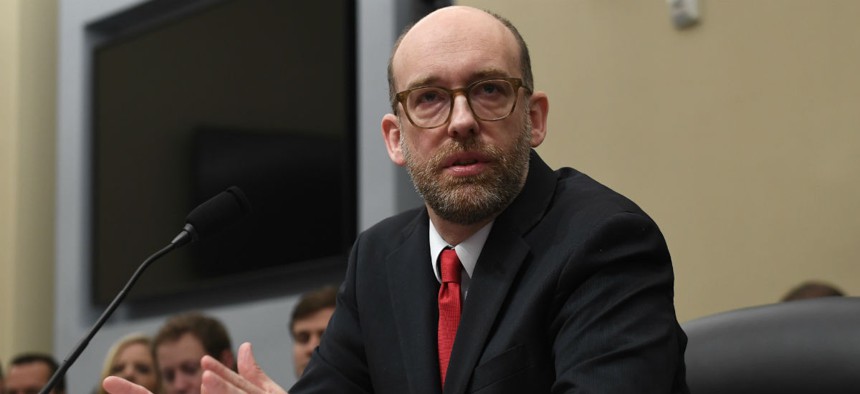White House's Push for More Oversight of Agency Data Has Some Scientists Concerned
OMB wants to make more agency data public, peer reviewed and reproducible.
The White House issued a memorandum on Wednesday that places more oversight on federal agencies' use of information and data for decision-making, including new requirements that have some concerned that the Trump administration is looking to sideline scientific research.
The memo, issued by Office of Management and Budget acting Director Russ Vought, updates 2002 guidance implementing the Information Quality Act. It requires agencies to formulate clearer definitions of which types of information qualify as “influential” and establishes a slew of changes for using such information in policymaking and issuing regulations.
OMB, for example, said many agencies still do not have “robust peer review mechanisms” when analyzing and interpreting data and called on them to beef up those processes. Agencies must go through that process again each time they make adjustments to their assumptions. The memo requires agencies to send their proof of peer review to OMB’s Office of Information and Regulatory Affairs so it can monitor compliance.
Andrew Rosenberg, director of the Center for Science and Democracy at the Union of Concerned Scientists, said all scientists aim to have their work peer reviewed, but the specifics of the new requirements could gum up the works.
“It could be one of these things that causes an unbelievable amount of administrative burden for agencies trying to move things forward,” Rosenberg said.
Other provisions that raised concerns for members of the scientific community were new requirements for making data public whenever possible. Unlike previous efforts to ban the use of “secret science” that prohibited agencies from using data that is not fully available to the public—which is often the case due to privacy concerns of individuals in testing and surveys—the memo allows for protections of personally identifiable information. OMB still said agencies should find ways to provide access to its data while reducing the risk of disclosing private information. Several former federal officials said it is now unclear whether agencies can still use data that cannot be fully made public.
Chris Zarba, director of the Environmental Protection Agency’s Science Advisory Board until he resigned in 2018 after nearly 40 years at the agency, said the memo appeared less strict than a previous effort to restrict the use of non-public data in agency research, but was written in a broad enough way that it “might be a way to really push that point.”
“It could be used in a way to slow things down,” Zarba said, “and with this administration, I’m very suspicious.”
Rosenberg was also skeptical, noting the memo lacks clarity.
“There are some real questions about the consequences here,” he said. Rosenberg, who holds a Ph.D. in biology and spent much of his career at the National Oceanic and Atmospheric Administration, said if he were handed the memo today and told to enforce it—as is currently happening at agencies across government—he would be unclear on what steps to take as “it’s not obvious what it means.”
Nick Hart, CEO of the Data Coalition, a group that promotes full transparency of government information in order to hold agencies accountable, called the memo a non-controversial, positive step. He noted that many of the provisions successfully implement bipartisan recommendations that came out of laws and commissions to promote open data and evidence-based policymaking.
Public and open datasets are “a good thing,” Hart said. “It’s good for accountability, good for transparency.”
The memo requires agencies to make data available upon request to any group or individual “for purposes of developing evidence,” unless such a disclosure is prohibited by law. Rosenberg noted that in cases such as academic research, there is simply an agreement between researchers and subjects that the information will stay private rather than any legal barrier.
Questions such as those, he said, could have been addressed if the administration had made any outreach effort to the broader scientific community prior to issuing the memo. OMB also mandated that agencies must make public all their assumptions, context and information used in gathering data, including computer code, to allow it to be reproduced.
Rosenberg said the requirement was “not a practical standard in any field of science that I’m aware of.”
Another piece of the memo was aimed at giving the public an easier path to disputing agency findings in their regulations and rulemaking. Agencies must respond to requests for corrections from the public within 120 days. Those responses must be vetted through OMB. The goal is to provide avenue for challenging technical information underlying a policy, OMB said, rather than to debate the policy itself. When information is challenged in a further review, agencies are now required to ensure a different set of employees other than those involved in the initial policy is responsible for responding.
Again, Rosenberg suggested the process could provide “an easy way to block progress.” The memo does not make clear what happens to rules and regulations while they are being challenged and reviewed.
Zarba said the potential for burdensome delays was one of many issues raised in the memo.
“The devil is in the interpretation,” he said.
Hart, however, defended the policy, saying it would help raise important questions about the data government agencies use.
“We need to have robust dialogue about what the information means and whether it’s even the right information to be using to make a decision,” he said.
Rosenberg disputed this notion, saying the only groups with the resources to challenge the findings of federal agencies are the regulated industries themselves.
OMB, for its part, said the changes were merely required to “address changes in the information landscape and to incorporate best practices developed over time.” Agencies will have 90 days to implement the memo’s requirements.




